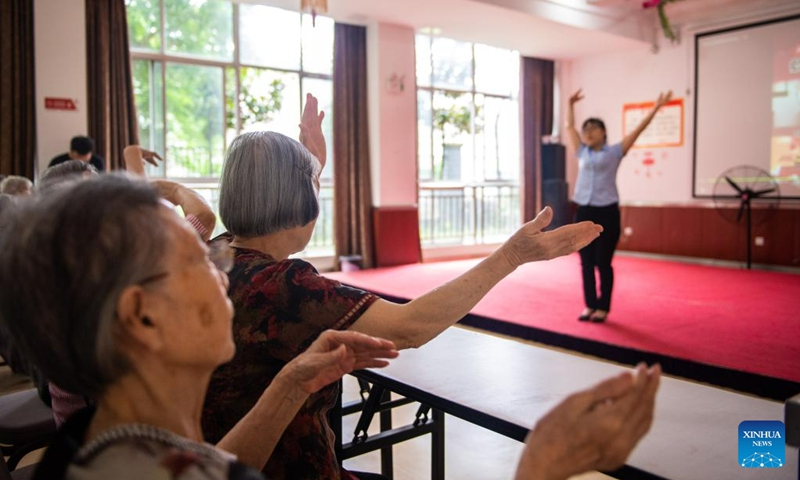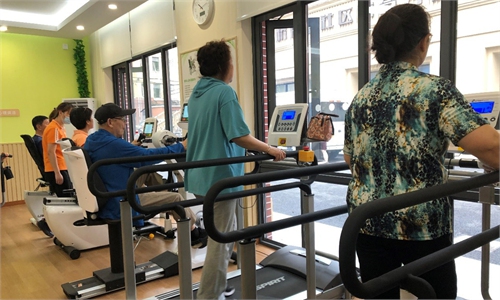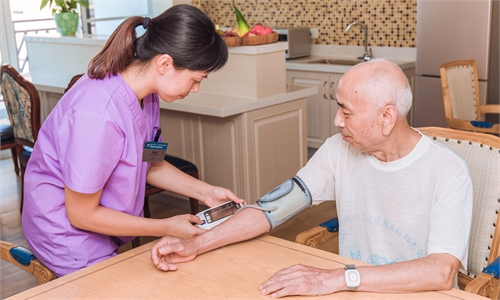
Senior residents dance following the guidance of a staff member at a social welfare center in Hanshou County of Changde City, central China's Hunan Province, June 20, 2023. The city of Changde has scaled up efforts to develop an elderly care service system composed mainly of in-home cares, community services, institutional and medical cares. (Xinhua/Chen Sihan)
Chinese officials vowed on Monday to fully implement a recently released development plan for the "silver economy," or the eldercare industry, to cope with an aging population and foster new economic growth drivers. A number of Chinese companies have also been stepping up investment in the industry that could be as big as 30 trillion yuan ($4.18 trillion) by 2035.
Analysts said that due to China's aging population, the "silver economy" is becoming increasingly important for China's social and economic development, and efforts in boosting the eldercare industry will not only help the country cope with this demographic change but also help ensure a sustainable growth.
"Actively coping with the aging population is related to the overall development of the country, the well-being of hundreds of millions of people, and is closely related to everyone and every family," Zhang Shixin, a deputy secretary-general of the National Development and Reform Commission (NDRC), the top economic planning agency, told a press conference in Beijing on Monday.
At the press conference, officials from the NDRC, the Ministry of Industry and Information Technology, the Ministry of Civil Affairs and the Ministry of Commerce revealed measures to boost the "silver economy."
Li Yongxin, an official from the Ministry of Civil Affairs, said that the ministry will work to increase the supply of eldercare services, including nursing homes in rural areas, while fostering new service models and nurturing talent for the eldercare industry.
As the population continues to age, China has in recent years released several national development plans for the "silver economy." On January 15, the State Council, China's cabinet, unveiled a guideline on promoting the development of the "silver economy."
The guideline contains 26 measures in four areas, ranging from tackling urgent challenges faced by the elderly, expanding the supply of eldercare products and services to fostering industries with vast potential.
"With an increasingly aging population, the role of the 'silver economy' in China's national economy will become more and more important. Its proportion in consumption, investment and total demand will become higher and higher," Li Changan, a professor at the Academy of China Open Economy Studies of the University of International Business and Economics, told the Global Times on Monday.
Li said that to successfully realize China's modernization, the vitality of the ''silver economy'' must be stimulated.
According to the guideline of State Council, the scale of China's silver economy stands at about 7 trillion yuan, about 6 percent of China's GDP, and the scale could reach 30 trillion yuan by 2035, accounting for about 10 percent of GDP, according to China Media Group.
Chinese businesses have been actively exploring new eldercare services. Tech giant Tencent Holdings said that it set up a lab for "silver technologies," in a bid to create sustainable paths for technology to help protect the safety of the elderly and support their digital lives, the company said in a statement sent to the Global Times on Monday, adding that it has been focusing on exploring innovative products and solutions for "smart" and inclusive eldercare.
Zhang Yi, CEO of iiMedia Research Institute, said that with the rise of the elderly population, the demand for "smart" high-tech equipment is on the rise.
"The huge consumer demand brought by the eldercare market will help drive the improvement and upgrading of existing products, thereby eliminating redundant inventory in the market and promoting a virtuous cycle in the consumer goods industry," he told the Global Times on Monday.



